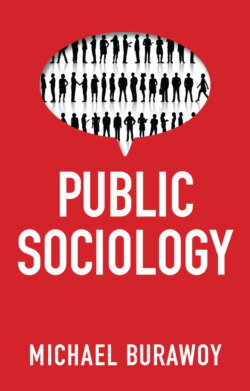Читать книгу Public Sociology - Michael Burawoy - Страница 11
1 Theory Utopia and Anti-Utopia
ОглавлениеAs a science sociology is unusual in that it refuses to forget its founders. How is it that we continue to draw inspiration from three European men – Marx, Weber, and Durkheim – from the nineteenth century? From the standpoint of the present they have their inevitable blind spots: a limited focus on questions of race and gender; an often naïve belief in science; and a Eurocentric outlook on the world. They were very much a product of their era and its assumptions.
Indeed, Raewyn Connell (1997) has argued that these so-called classical sociologists had a limited vision of their own times and were arbitrarily chosen after World War II to represent the canon. Upon their shoulders rests the edifice of modern sociology, thereby eclipsing the contributions of a myriad social thinkers from outside Europe. Whereas sister-disciplines like anthropology, economics, and political science have reduced their founders to mere historical interest, Marx, Weber, and Durkheim hang on as obligatory but also inspirational reference points for sociology. Prominent contemporaries, Pierre Bourdieu or Jürgen Habermas, built their social theory on the basis of the same founding figures, implicitly in the case of the first and explicitly in the case of the second. Attempts at building alternative foundations, such as James Coleman’s rational choice theory, never made much headway or gained many adherents.
There is, however, one candidate with irrefutable credentials, around whom it is possible to reconstruct the canon – W. E. B. Du Bois. An African American born ten years after Durkheim and four years after Weber, he is of their generation but outlived them by nearly half a century. Educated at Fisk, Harvard, and the University of Berlin, Du Bois pioneered urban sociology at Atlanta University before launching into a public career as a founder of the National Association for the Advancement of Colored People (NAACP), editor of The Crisis magazine, and organizer of Pan-Africanism. In 1934 he returned to Atlanta University to complete his extraordinary history of the Civil War and Reconstruction. As he became ever more hostile to the US state that persecuted him, he moved further leftwards, endorsing the socialist vision represented by the Soviet Union and “Communist” China, and ending his life in newly independent Ghana. As a novelist and poet (Du Bois 1911, 1928) he gave sociological theory a uniquely utopian twist that imagined the transcendence of racial and gender domination as well as class exploitation, an optimism always qualified by an anti-utopian science that tragically spelled out the limits of social transformation.
Changing the canon is not simply a matter of adding him to or replacing Marx, Weber, and Durkheim. A canon is always more than the sum of its parts. It refers to a configuration of relations among its members. Du Bois’s historically rooted, engaged sociology calls for a reconfiguration of the canon, foregrounding its public and critical dimensions, advancing the duality of utopian imagination and anti-utopian science. I start with the continuing significance of the relations among Marx, Weber, and Durkheim, before pointing to a new canon that incorporates Du Bois’s publicly engaged and historically embedded sociology.
